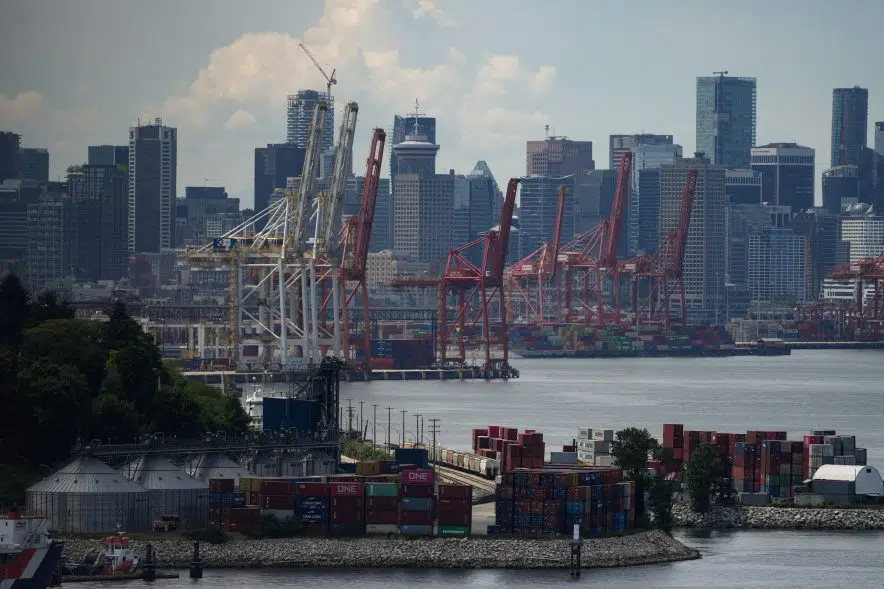Saskatchewan Premier Scott Moe again is calling for action after the resumption of the B.C. port workers’ strike.
Before a tentative deal was reached last Thursday to end the 13-day strike, Moe was among those calling for a settlement to the strike, saying a deal would be for “the betterment of all Canadians.”
On Tuesday, just five days after the tentative agreement was reached, the International Longshore and Warehouse Union Canada (ILWU) announced it had rejected the deal proposed by a mediator. After hearing that news, Moe called on the federal government to step in.
“The work stoppage at the Port of Vancouver has already had a devastating impact on Saskatchewan’s economy,” Moe wrote in a tweet. “We simply cannot afford for this disruption to continue any longer. Saskatchewan jobs and export-based industries are at stake.
“While I was encouraged that the federal government had worked with the parties to end the previous work stoppage, it is now time to provide certainty and stop this new disruption immediately.”
The initial work stoppage prompted Nutrien to cut back production at its Cory mine southwest of Saskatoon.
The union didn’t pull any punches when announcing it had rejected the proposed deal.
“The ILWU Canada Longshore Caucus does not believe the recommendations had the ability to protect our jobs now or into the future,” the union said in a statement on its website.
The union said the proposed four-year deal “with today’s uncertain times, is far too long.” The workers returned to the picket line late Tuesday.
The B.C. Maritime Employers Association said in a statement that the union didn’t even take the proposed deal to its membership for a vote.
“This fair and comprehensive package could not satisfy some of ILWU internal caucus leadership, and in rejecting this tentative agreement, ILWU Leadership is choosing to further harm Canada’s economy, international reputation and most importantly, to Canadians, their livelihoods and all those that rely on a stable supply chain,” the employer said.
The company said the proposed agreement included “considerable hikes in wages and benefits,” specific provisions that addressed the union’s concern about work being contracted out, and measures to improve training, recruitment and retention of ILWU trades workers now and in the future.
“Clearly this fair and equitable package wasn’t enough for the ILWU internal leadership, and they chose to instead remain entrenched in their position with little regard to the lives and jobs they are impacting,” the company said.
According to The Canadian Press, the federal government says it’s looking at all options after the resumption of the strike.
In a joint statement, Labour Minister Seamus O’Regan and Transport Minister Omar Alghabra said workers and employers across Canada cannot face further disruption.
The ministers said they have been patient and respected the collective bargaining process, but they need the ports operating.
Saskatchewan minister responds
Saskatchewan’s government is watching the developments in B.C. with frustration.
“At the end of the day, we need to get to a point here where the strike is over, the ports are functioning again,” said Highways Minister Jeremy Cockrill.
“It does have a pretty significant impact on our provincial economy.”
The minister said Saskatchewan accounts for a significant portion of the bulk traffic that goes through the Port of Vancouver, which sees $800 million worth of product pass through it each day.
Potash in Saskatchewan has already been affected, with Nutrien announcing last week that it was going to slow down production at one of its mines because it couldn’t get its product to buyers.
“When we talk about 6,000 jobs in this province that are directly related to the potash sector, not to mention the thousands of other jobs related to that, that support the mining sector in this province – that’s really what’s at stake here for our province,” said Cockrill.
And, Cockrill said, the longer the strike goes on, the bigger the backlogs that can pile up, and that can affect everyone trying to ship products, including the agriculture sector as harvest season looms.
“Even though grain can still move, when there’s a backlog created for the railways and for other shippers trying to move product through those ports, it’s inevitably going to create delays for everybody down the road,” he said.
The Saskatchewan government’s support for the ending of the strike has been criticized by some as anti-labour, but Cockrill defended the position as pro-Saskatchewan.
“We’re trying to impress on the federal government and the parties involved in this dispute that this stoppage has a significant impact on the people of Saskatchewan, and that’s who we’re concerned about in this situation and protecting those jobs and our economy,” said Cockrill.
He said the provincial government wants the federal government to be on the ground in B.C. again and use every tool it has to find a solution to the situation.
— With files from The Canadian Press and 980 CJME’s Lisa Schick







